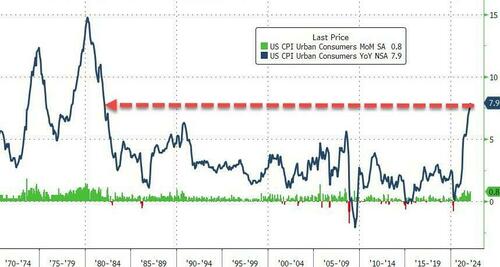Volkswagen CEO Warns Ukrainian War Could Be Worse For Europe Than COVID
No, this isn’t an April Fool’s joke.
Volkswagen CEO Herbert Diess told the FT in an interview published Thursday that a prolonged war in Ukraine would be “very risky” for the European and German economies – and that it ultimately might be even worse for them than COVID.
According to the FT, Diess said the economic damage from the war could be “very much worse” than the pandemic.
“The interruption to global supply chains could lead to huge price increases, scarcity of energy and inflation,” Herbert Diess, chief executive of the German carmaker, told the Financial Times.
“It could be very risky for the European and German economies.”
The warning, from one of Europe’s most authoritative business leaders (since Volkswagen is still Europe’s biggest car maker by sales volume), is just the latest reminder that the ripples from the conflict are being felt far away from the battlefield. Just yesterday, McDonald’s and Coca-Cola caved to public pressure and decided to temporarily suspend operations in Russia. They’re the latest in a long line of western businesses who have cut ties.
Volkswagen, like all auto makers, has struggled thanks to shortages of semiconductor supplies.
But Deiss fears these “supply chain” risks will worsen thanks to western sanctions against Russia, which has become seriously entangled with Europe in terms of not just oil and gas exports but wheat and other commodities as well.
But it’s not just the supply chain issues: there’s also the “threat of war”, which Europeans should take seriously.
The warning from one of the continent’s best-known business leaders comes as western governments ratchet up their economic efforts to punish Russia, a key global supplier of commodities from gas to palladium, for its invasion of Ukraine.
The sanctions imposed so far – and the prospect that the Kremlin could retaliate by turning off gas supply to Europe – has sent energy markets into turmoil.
“The threat of this war for Germany and Europe is huge,” said Diess, pointing out that higher inflation could severely squeeze consumers.
As we noted earlier, US CPI climbed to 7.9% YoY in February, with the hottest monthly rate since October and the 21st straight (non-transitory) monthly increase in prices.
Inflation is an international problem, and the Europeans are also feeling the pain: European inflation has hit a new record of 5.8% in February and is forecast to rise as high as 7% this year. The European Central Bank meets on Thursday, facing the threat of both rising prices and slower economic growth.
Germany has already opted not to follow the US with sanctions on Russian energy products, and Deiss said that while he was personally in favor of “maximum sanctions”, afterwards, Germany would need to return “to the negotiating table” to find a permanent solution to this conflict.
“We have to come back to negotiations, to dialogue, because what we don’t want is a never-ending war in Ukraine,” Deiss said.
Though Deiss didn’t come out and say it (at least not in the interview), concessions from the Ukrainian side would be inevitable to achieve lasting peace. France 24 recently reported that Ukrainian President Volodymyr Zelensky had said he is no longer pressing for NATO membership for Ukraine, and Zelensky himself has said that his desire to join the alliance has “cooled” .
Stopping the war would probably require assurances from the US.
Tyler Durden
Thu, 03/10/2022 – 10:00
via ZeroHedge News https://ift.tt/CUFY30q Tyler Durden

